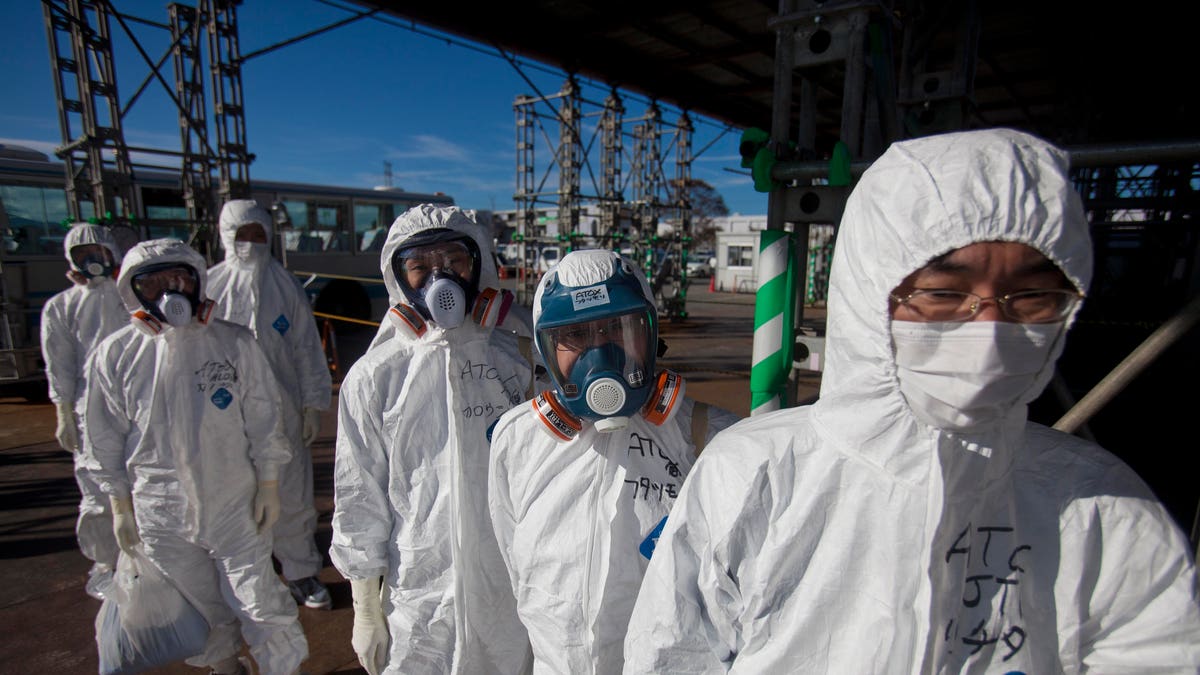
Nov. 12, 2011: In this file photo, workers in protective suits and masks wait to enter the emergency operation center at the crippled Fukushima Dai-ichi nuclear power station in Okuma, Japan. (AP2011)
TOKYO – The operator of Japan's crippled nuclear power plant is still stumbling in its handling of the disaster 16 months later, by dragging its feet in investigations and trying to understate the true damage at the complex, investigators said Monday.
The report by a government-appointed panel is among several that have faulted Tokyo Electric Power Co. and the government for doing too little to protect the Fukushima Dai-ichi plant from the earthquake and tsunami that hit it in March 2011, and for mishandling the response when the damage set off three reactor meltdowns in the world's worst nuclear accident since Chernobyl.
The investigators said the utility has yet to address problems within its own culture that contributed to its failings in the crisis, including employees "not fully trained to think for themselves."
"We still don't perceive much enthusiasm in the accident investigation from" the company, the report said. "TEPCO must take our findings sincerely and resolve the problems to achieve a higher level of safety culture across the company."
The panel said TEPCO covered up unfavorable data in a computer analysis attempting to measure the extent of damage inside the reactors earlier this year. It said TEPCO officials acknowledged the simulation was inadequate, but they have yet to make another attempt.
In interviews with panel members, employees of TEPCO's nuclear department demonstrated expertise in emergency equipment, but many failed to speak up when it was most needed during the crisis, the report said.
For instance, some employees were aware that water gauges attached to containment vessels were likely broken and their measurements unreliable. But none of them raised questions, and the company kept releasing what turned out to be wrong data for months. New gauges installed in one reactor show that there is hardly any water inside, suggesting that the two other crippled reactors may have similar conditions.
The workers "were not fully trained to think for themselves, and lacked a flexible and proactive way of thinking needed in crisis management," the report said.
Monday's report, like others before it, said the operator and regulators failed to upgrade plant safety and meet international standards to minimize risks, including the possibility of severe damage from power outages.
The three reactors melted down after the March 11, 2011, tsunami knocked out the plant's cooling system. The nuclear disaster displaced tens of thousands of people and will take decades to clean up.
TEPCO officials said they plan to examine the report thoroughly to verify its findings.
"We will respond sincerely if we find anything we should reflect on," company spokesman Junichi Matsumoto said.
The 450-page report also says the government and its main nuclear regulator, the Nuclear Industrial and Safety Agency, promoted nuclear power as an entirely safe form of energy without being open about its inherent risks.
It said NISA, which was under the economic ministry, was a toothless entity that failed to live up to its expected role. The government is overhauling the agency to make it more independent and effective.
The panel of 10 independent experts in fields including radiation protection, medicine and law approved the report in its final meeting Monday. They handed it to Prime Minister Yoshihiko Noda, who said he will use the findings and recommendations to help guide the revamped regulatory agency, which is to start up by September.
"We take it seriously," Noda said of the report.
The panel said the government and TEPCO failed to prevent the crisis not because such a large tsunami was unanticipated but because they were reluctant to invest time, effort and money in protecting against a natural disaster considered unlikely. TEPCO had even weighed in on a report about earthquake risk and asked the government to play down the likelihood of a tsunami, the report said.
"The root cause of the Fukushima crisis is that they selfishly assumed that natural disasters that are beyond their imagination would not occur. In short, they underestimated natural disasters," panel chairman Yotaro Hatamura told a news conference.
Those finding echo a Diet-sponsored investigation released earlier this month that said the disaster was a "man-made" result of collusion between the government, regulators and the utility.
The latest report said poor crisis management prompted then-Prime Minister Naoto Kan and his Cabinet to excessively intervene in plant operations, but that only added to the chaos.
The report criticized Kan's office for controlling information, delaying crucial announcements to the public and overly softening expressions about the severity of the accident, causing confusion, threats to health and public distrust in the government.
Political leaders were upset after a NISA official let it slip on March 12 that the reactors were possibly melting down, the report said. After that, all NISA announcements had to be run by the prime minister's office. NISA denied meltdowns for months afterwards.
The panel interviewed more than 770 people, including plant workers, government officials and evacuees, for a total of nearly 1,500 hours.
The report also didn't find any clear evidence that the initial impact of the 9.0-magnitude earthquake had caused major damage that would trigger radiation leaks from the reactors. That conclusion contradicts a parliament-appointed panel report, which one of the reactors that melted down had leaks that probably were caused by the earthquake.
Hatamura wrote in a closing note that Japan "should take the accident as a reminder from nature that humans' way of thinking can be defective."
"We must never forget this disaster and continue to learn the lessons from it," he said.
